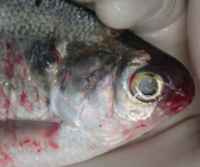
Photo from wikipedia
The protozoan Cryptocaryon irritans is one of the most important ectoparasites of marine fish, causing 'white spot disease' and mass mortality in aquaculture. To accurately predict disease outbreaks and develop… Click to show full abstract
The protozoan Cryptocaryon irritans is one of the most important ectoparasites of marine fish, causing 'white spot disease' and mass mortality in aquaculture. To accurately predict disease outbreaks and develop prevention strategies, improved detection methods are required that are sensitive, convenient and rapid. In this study, a pair of specific primers based on the C. irritans 18S rRNA gene was developed and used in a real-time PCR (qPCR) assay. This assay was able to detect five theronts in 1 L of natural seawater. Furthermore, a linear model was established to analyse the log of Ct value and parasite abundance in seawater (y = -2.9623x + 24.2930), and the coefficient of determination (R2 ) value was 0.979. A lysis buffer was optimized for theront DNA extraction and used for storage sample. This method was superior to the commercial water DNA kit, and there was no significant degradation of DNA at room temperature for 24-96 hr. A dilution method was developed to manage qPCR inhibitors and used to investigate natural seawater samples in a net cage farm with diseased fish, and the findings were consistent with the actual situation. This study provides a valuable tool for assisting in the early monitoring and control of cryptocaryoniasis in aquaculture.
Journal Title: Journal of fish diseases
Year Published: 2022
Link to full text (if available)
Share on Social Media: Sign Up to like & get
recommendations!